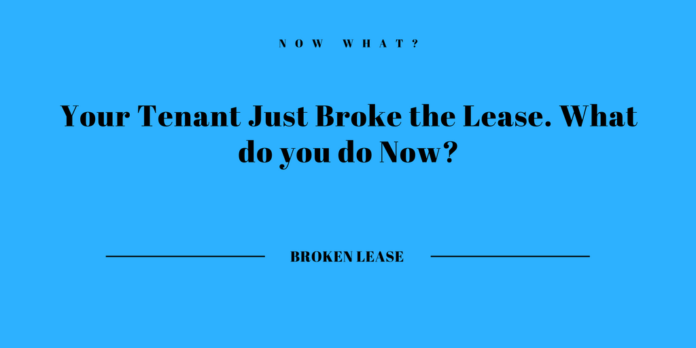There may come a time when your tenant notifies you that he/she is breaking the lease and it is your responsibility to be aware of what to do if those circumstances arise.
Breaking the Lease – What to do?
First off, why are they breaking the lease?
While a lease is a legally binding document, there are exceptions which could potentially allow the tenant to break the lease without binding consequence.
Military Personnel
For example, Federal Law allows Military personnel to break a lease if they are summoned for active duty that would take them 50 miles away from the location of the rental property. The law also requires that they provide a 30 day notice to the landlord which does provide time to prepare the property in order to find a new tenant. These circumstances are important to know when leasing to active Service Members.
Landlord Fails to Uphold Their end of the Lease
Other circumstances in which the tenant may break the lease without consequence could very well be because of you, the Landlord. If the owner or manager fails to hold up their end of the lease as it relates to required repairs, or violations in which the landlord is infringing upon the privacy of the tenant, they may very well have a rightful path to legally break the lease. Keep in mind, the lease is a two-way street and the landlord should be just as familiar with their own obligations as that of the tenant.
Tenant Fails to Uphold Their end of the Lease
Okay, now what if the tenant is breaking the terms of a legally binding lease without recourse, what is next? This could be circumstantial, perhaps they received a job transfer and need to leave the state. If so, you have the lease to protect you, but the departing tenant may want to try and work with you by helping find a replacement tenant. They are “on the hook” so to speak to continue paying rent based upon the terms of the lease agreement up until you find a replacement tenant. Keep in mind, once you find a new tenant, there is no double dipping on rent as a new lease and new tenant will replace the previous lease. Until then, the outgoing tenant remains responsible for terms and conditions of the lease.
Tenant Makes False Claims Against Landlord
What if the tenant makes false statements about the property and/or the landlord in an effort to get out of the lease? While this would be unfortunate, it would not be the first time it has happened. This is when all of the upfront work that you have done can help protect you. Ensuring the tenant signs off on the condition of the property upon move in is essential, then documenting any of their complaints about the property (in writing), and how you provided a solution would go a long way in making sure a tenant cannot misrepresent a situation. Save your maintenance records and receipts and whenever possible, try to document any of your exchanges in writing so that you have it on the record (even the small stuff).
By now, you probably know how important it is to have a lease that protects you and your asset, while also making sure the responsibilities of the tenant are very clear. Knowing your role under the terms and conditions of the lease are imperative, as are knowing the circumstances in which a lease can and cannot be broken. Should you have to go down the path of legal action if a tenant unrightfully attempts to break the lease, make sure you have covered all of your bases so that you are rightfully compensated under the circumstances.














